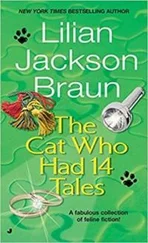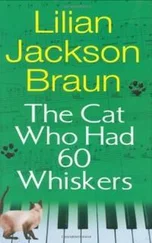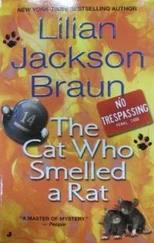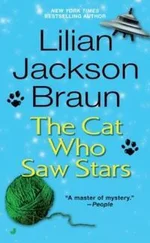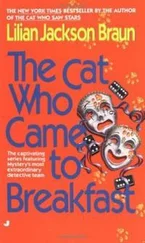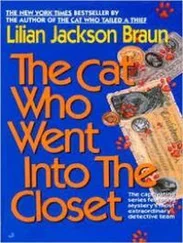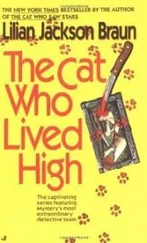“You think fast on your feet, Gary.”
“Yeah, well . . . I was sitting down. I figured that you didn’t want her and her weird boyfriend as houseguests. Anyway, I said she could leave a message for you at the newspaper. You can take it from there. Brrr has plenty of campsites where you can sleep in your car and use the camp facilities, but the thing of it is, I’m afraid she’s gonna make a stink about losing Mount Vernon. She’s a crafty one! Ask anybody. Do you think I should notify the authorities?”
“It wouldn’t hurt!” Qwilleran was beginning to regret he’d commissioned her to research Koko’s antecedents. That little four-legged sleuth had known there was something fishy about her from the beginning! “So, what’s the good news, Gary?”
“Well! The reservations for the Great Storm show are all taken! We’ve got to add more performances! Even though there’s no charge for admission, they’re plunking down ten- and twenty-dollar donations!”
Qwilleran said, “I hope they won’t be disappointed. The script isn’t as sensational as the one for the Big Burning.”
“It’s you they want to see and hear, you chump! And what I heard and saw tonight—terrific! We should add Sunday matinees and some more evening performances in July and August.”
“Well,” he said modestly. Actually, before switching to journalism, Qwilleran had wanted to act on the stage. (He had also wanted to be a pro ballplayer or jazz pianist, but that was another story.) “How does Maxine feel about added performances? I don’t want to make do with substitutes.”
“My wife is suddenly stagestruck! She’s talking about taking the show on the road!”
Qwilleran spent the next morning polishing his column about Agatha Burns, aware that it should sound like a tribute to a hundred-year-old and not an obituary. There was an early deadline for Friday’s Something, which would hit the street at ten A.M. with a banner headline: HAPPY 200TH!
He walked downtown to file his copy and stopped at the florist shop to order centerpieces for the wedding dinner. Claudine greeted him effusively, even though her big blue eyes looked at him with apprehension.
“Do you have any short lilies?”
She paused and glanced around the shop. “I never heard of short lilies. They grow on long stems—as a rule, that is. But I could call our supplier in Chicago. How soon do you have to have them?”
“They’re for a dinner party Saturday evening, and I’ve been instructed to order two low arrangements of mixed white and yellow lilies, without any stuffing.”
“I suppose we could cut the stems short.”
“Do you have low bowls?”
Two low bowls of imitation cut glass were produced and discussed. Was it necessary to have matching bowls? How many blooms would each contain? Four would be too few and six too many, but five would pose a problem: three yellow and two white, or vice versa? The solution: one bowl with white predominating and the other with yellow predominating, to be delivered to Boulder House for the Qwilleran table.
Showing much relief, Claudine said she would phone Chicago at once.
In the early afternoon, Qwilleran wandered into the classiest shop in town. Modest gold lettering in one corner of the plate-glass window stated: EXBRIDGE & COBB, FINE ANTIQUES.
Qwilleran asked Susan Exbridge, “Do you ever have any miniature porcelain shoes?”
“No, but I know where to find some. Are you starting a collection? There are some serious collectors here and in Lockmaster.”
“I’ve just met one of them, Edythe Carroll. She invited me to tea the other day, and I thought I’d like to send her a shoe.”
“I wouldn’t advise it,” Susan said. “Her collection is a very private matter, pursued by her and her husband throughout their married life. She has told me she wants no more, now that he’s gone. The last shoe they found together was a Meissen porcelain while they were vacationing in Germany. Edythe keeps it on her bedside table.”
Qwilleran nodded sympathetically. “I quite understand. There must be a hundred or more in her glass-front cabinet. I must say that miniature shoes strike me as a strange item to collect. What’s the story behind them?”
“Come in the office for a cup of coffee and I’ll tell you what I know.”
Every inch of wall space in the office was covered with shelves—for reference books on antiques. Susan noted his appreciative glance at them. “These books belonged to dear Iris Cobb. I owe so much to her.”
“We all do,” Qwilleran said, as he sipped his coffee. Then—“On the question about the shoes, why were they made in the first place?”
“In Victorian times they held matches, toothpicks, salt, snuff. Some were pincushions. There was a great demand for them in the nineteenth century, and porcelain factories in many European countries were turning out high-heeled shoes, boots, slippers, and oxfords—with all kinds of decorations: flowers, birds, cherubs, and so forth. Collectors make a study of the dates, makers’ marks, glazes, et cetera. Prices can run as high as a thousand.”
“Hmmm,” Qwilleran murmured into his moustache. “You know a great deal about the subject, considering you don’t handle it in your shop.”
“I’ve been spending long hours with Edythe,” Susan explained. “After her husband died, she asked me to help her update the catalogue of her antiques in Mount Vernon. Most were handed down in her family. She was a Goodwinter, you know. And now that she’s decided to donate the house and contents to the community, as a museum, it’s important to have accurate descriptions and values. When she moved to Ittibittiwassee, I helped her select the pieces she wanted to keep. Most important was the china cabinet filled with shoes. Why am I telling you all this?”
“Because you know I’m interested and concerned.”
“And you’re not a gossip. Darling!” She returned to the brittle style she affected. “Are you sure you don’t want to buy something before you leave?”
“How much do you want for that ten-foot breakfront?”
“You couldn’t afford it!” She chased him out of the store.
For Scottish night, Qwilleran wore a kilt in the Mackintosh tartan—red with a fine green line. Polly wore a tartan sash looped under one arm and pinned on the opposite shoulder with a cairngorm; the Duncans shared a colorful tartan with the Robertson clan.
“Qwill! You look so wonderful. I think I shall cry!” she said.
“It’s a matter of the swagger that comes with a kilt. The devil-may-care tilt of a glengarry bonnet over the right eye, the toughness of knowing there’s a dagger in the cuff of one’s knee hose, and the pride of being a Mackintosh.”
“I’ve noticed that persons not entitled to wear Scottish attire seem very . . . ordinary by comparison,” Polly observed with a note of pity in her voice.
The ordinary ones stayed home Thursday night and watched the festivities on television. The TV crews had been in town all day.
In the early evening, the streets radiating from the Hotel Booze were filled with canny Scots who had parked on the outskirts and were walking toward the hub of activity. It was a kaleidoscope of clan tartans in vibrant reds, greens, blues, yellows, and combinations thereof. The wearers all had the quiet pride that Qwilleran had mentioned. He and Polly stopped to have a few words with the MacGillivrays, then the Campbells, the Ogilvies, the MacLeods, and more Campbells.
A hush fell on the crowd when the bell in the tower of the town hall tolled seven times. All eyes turned toward the hotel, and out came Chief Andrew Brodie with the lofty feather bonnet of a bagpiper, swaggering with a shoulder full of plaid and an armful of pipes. He was playing “Scotland the Brave.” Following him was Mayor Ramsey, pushing a wheelchair. The occupant was the centenarian, Miss Agatha Burns—fragile, calm, smiling. How many hearts turned over at the sight of her. Even those who had not been in one of her classes knew about the Burns mystique.
Читать дальше

